It Never Happened Again Sam Alden
Reviews
It Never Happened Over again: 2 Stories
Sam Alden is among the well-nigh gifted of the young cartoonists I've come up across in recent years. He has already established a sizable, rabid fan base through his Tumblr and deservedly won the Promising New Talent nod at terminal twelvemonth'due south Ignatz Awards, amidst a strong listing of nominees. The two stories featured inIt Never Happened Over again display Alden's impressive strengths every bit a visual storyteller. They feature completely different settings and characters, but take in mutual protagonists in search of things ineffable—perhaps unattainable. Each story casts its own foreign sort of spell, making for a very strong debut volume.
The first tale, "Hawaii 1997", was originally published on Alden's Tumblr and later as a mini (netting Alden the second of iii Ignatz nominations in 2013, this one for Outstanding Minicomic). I have rarely enjoyed reading an online comic equally much every bit I did this one. Alden posted it as a vertical gyre, and reading information technology felt like watching a mostly silent black-and-white film unreel. A unproblematic, dreamlike autobiographical narrative, "Hawaii 1997" depicts the eight- or ix year-old Alden, academic and a piddling gawky, at a Hawaiian resort during a family vacation. Early i day, he is playfully teased near his interest in a sunbathing teenage girl: "I guess he hasn't seen a lot of bikinis on the Oregon coast." That night, he slips out of bed to explore the beach and the water. A foreign, somewhat irascible young girl (shut to Alden's age) suddenly shows up. She initiates some shadow-stomping horseplay with him ("stomped your head"), so runs abroad, Alden in pursuit. The girl, who never offers her name, calls out to him earlier she vanishes into the night. Alden'south drawings of the shimmering, star-filled sky reflected on the water and the play of light and shadow on the children running are rich and tactile, evoking sense memories; yous can practically feel the warm dark air and hear the lapping of the salty ocean waves on the shore. The soft grays of Alden's loose pencil work add immeasurably to the feel of a mysterious, beguiling memory. It's a haunting piece of piece of work.
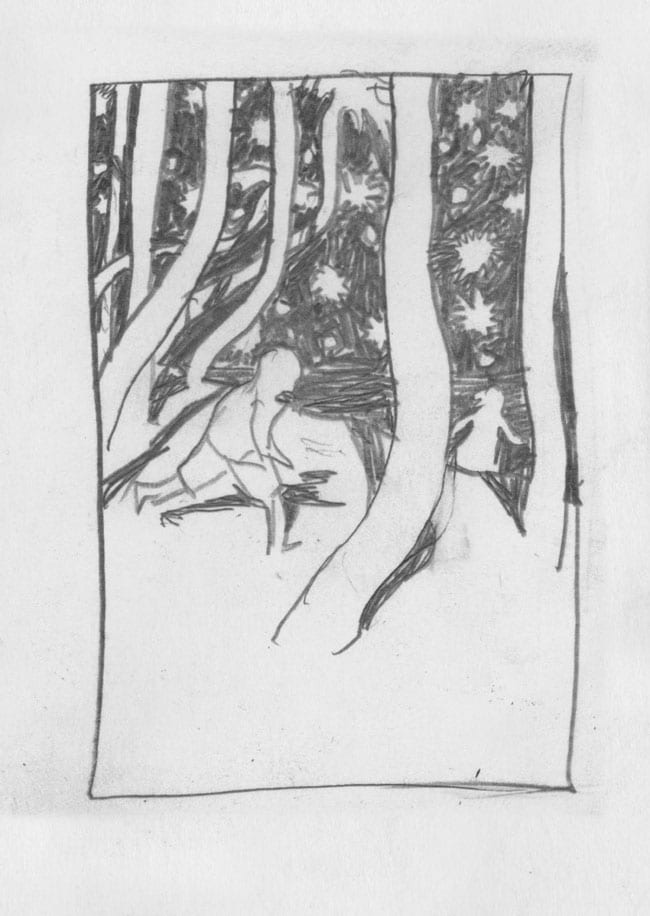
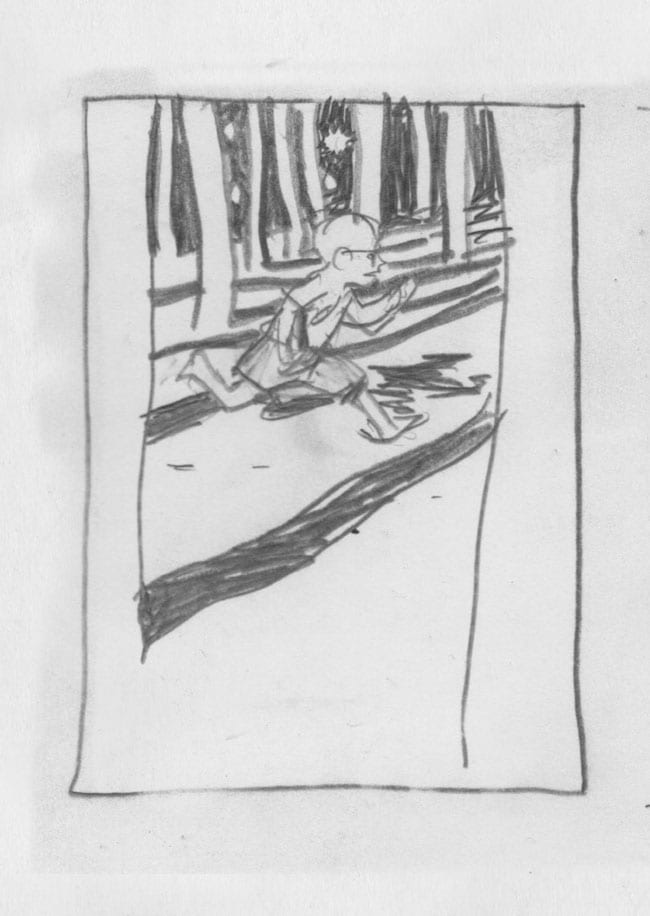

"Anime" is even better, an incisive character study and exploration of the dark side of obsessive fandom. The protagonist is Janet, a lumpish, socially awkward young adult female with a consuming involvement in unspecified anime programs and characters. Living with her fellow in his parents' basement, listless in her task, and alienated from her father, she is completely, light amplification by stimulated emission of radiation-focused on a trip to Japan she has planned with her boyfriend, where she clearly expects something transformative to happen. "At that place'southward no shame in not beingness smart plenty to get a scholarship," her father chides her, "only you're 20 at present and y'all do not even accept a plan." To Janet, Nippon is the only plan she needs. Alden's narrative drops in on progressive points in time (perhaps the span of one to two months), providing small details that paint an acutely disturbing portrait of Janet's dissociative personality. For example: When she meets two other anime fans at a passenger vehicle stop, Danielle and another unnamed girl, she gets to talking with Danielle. Janet formally introduces herself: "Y'all can call me Kiki. And yes,that Kiki, considering we are actually the verbal same person. Nosotros both have braids, nosotros were both witches when we were xiii, and nosotros both don't fit in with the towns where we live." Danielle politely tolerates this, while the other daughter recoils. Janet'southward interactions with other people evoke similar reactions. Working alternately equally an information clerk and Pedicab driver for a small guided tours outfit, she regularly misremembers restaurant locations and distractedly takes her annoyed passengers in the incorrect direction, too captivated in her own inner world to try very difficult.
When Janet finally arrives in Japan she doesn't engage with her surroundings there either. Alden cleverly illustrates this with a serial of silent panels showing her in dissimilar areas of the city, her back to the viewer in each, seemingly separated from the sensory information washing over her. She's as much an outsider hither as she is stateside.
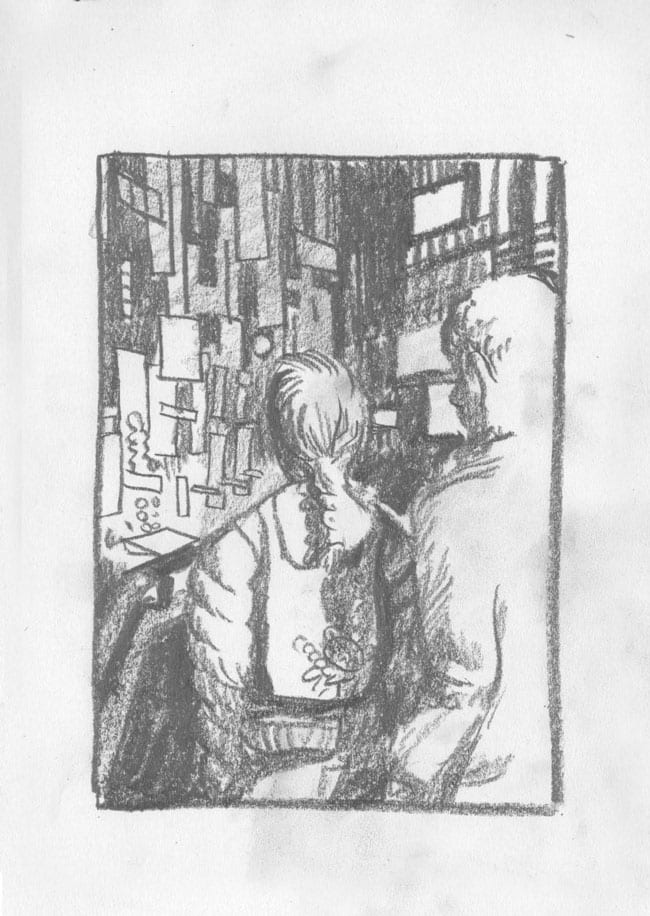
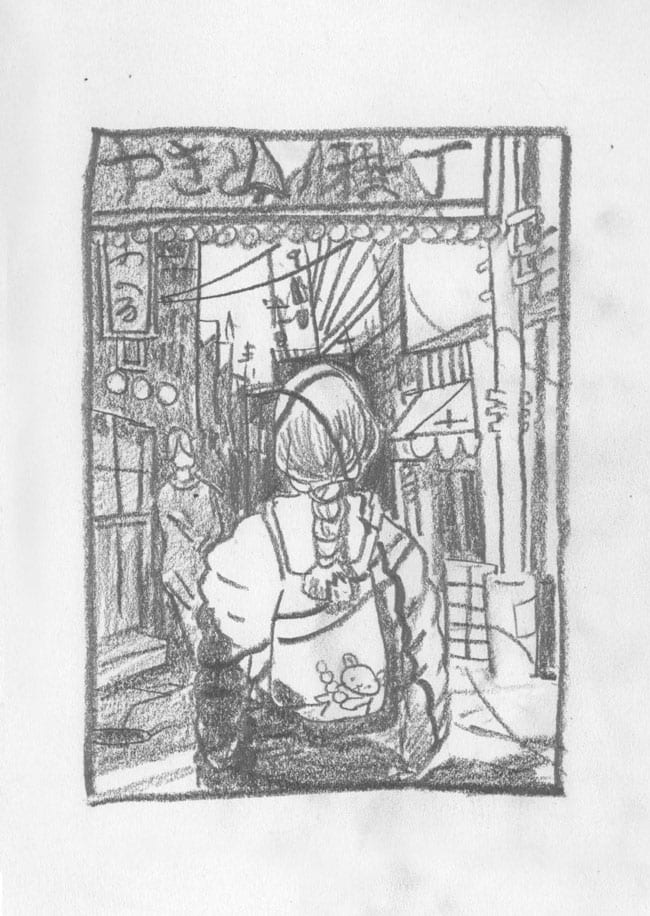
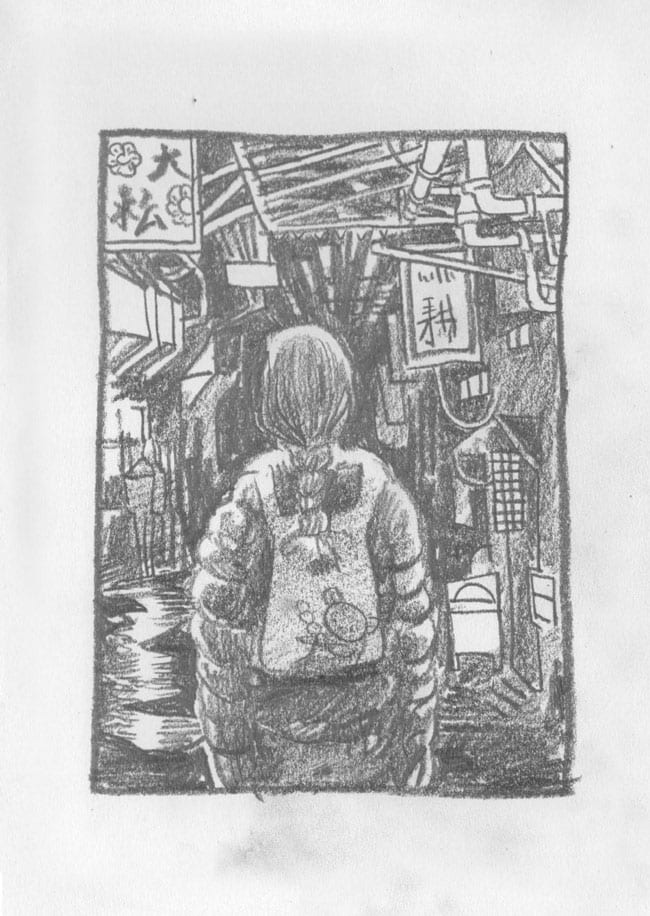
The story ends on a pocket-size grace note, with the suggestion of some measure of happiness for Janet, but we remain highly hundred-to-one, even fearful for what ultimately may happen to her. Though I found Janet really annoying (the same way I find, say, sure fanboys who freak out when the "wrong" actor is cast in their favorite superhero franchise), I also felt sympathy for her. She emerges equally a real, 3-dimensional homo beingness, not merely a figure of scorn, as with Daniel Clowes's infamous über-nerd character, Dan Pussey. Janet's inability to integrate her enthusiasms into a balanced life has an ominous undercurrent of slow-building disaster. She can never seem to motility frontwards, only retreat into fantasy, away from the outside world, with its demanding fathers, immature bullies, and grasping, irritable customers. Alden has already demonstrated a keen psychological insight into damaged young people in his online stories similar "Backyard" and "Household". Eschewing narration, he conveys information objectively, allowing readers to fill in the blanks, resolve questions, and interpret to their ain satisfaction. His moody, nuanced visuals and intuitive, empathetic graphic symbol work in both "Hawaii 1997" and "Anime" reveal an already startlingly mature immature talent. It is genuinely exciting to contemplate how he will further develop in the years ahead. In the concurrently, you lot desire to go this book.

wilkinsoptale1948.blogspot.com
Source: https://www.tcj.com/reviews/it-never-happened-again-two-stories/